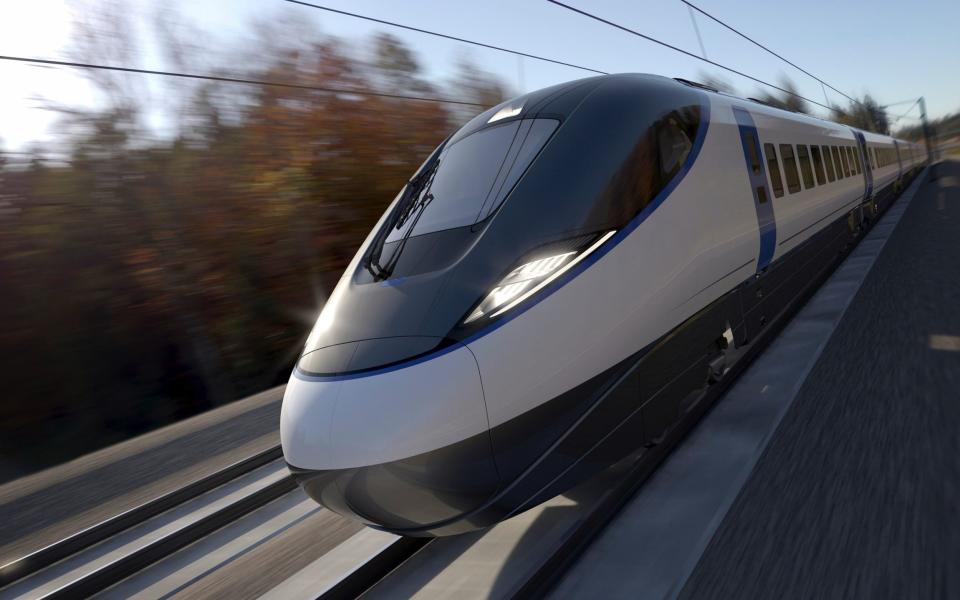HS2 train services to be almost halved under proposal to cut costs

The number of trains running on HS2 will be almost halved and services will travel more slowly in a proposed shake-up of the £72bn line as ministers scramble to save money.
Whitehall officials are considering reducing the number of trains from 18 to 10 an hour, insiders said.
Meanwhile, plans to run services at up to 360 km/h (224 mph) are in jeopardy as officials weigh whether to reduce maximum speeds.
The proposals are among a series of cost-cutting measures under discussion as part of an overhaul codenamed Project Silverlight and Operation Blue Diamond, as ministers grapple with huge inflationary pressures on Britain’s biggest infrastructure project.
The Department for Transport on Tuesday refused to rule out reducing the frequency and speed of HS2 trains.
A spokesman said: “We do not comment on speculation. Spades are already in the ground on the HS2 programme. It will better connect regions across the UK, provide a greener option of travel and is supporting tens of thousands of jobs.
“We remain committed to delivering the project from Euston to Manchester and continue to work in line with the Integrated Rail Plan.”
It came as the Transport Secretary Mark Harper criticised Labour’s plan to nationalise the railways, describing it as a “soggy sandwich wrapped in a clingfilm of backward thinking”.
In a speech on Wednesday laying out his vision for the future of train travel, Mr Harper said that nationalisation had already been “tried and ultimately thrown out”.
With all the focus on speed in the early years of its planning, HS2 was originally designed to run services at up to 400 km/h. This was reduced to an average of 330 km/h and maximum of 360 km/h once contracts to build new trains were awarded.
A journey at these speeds would still be faster than anything internationally with the exception of China, however, the latest review of the HS2 for the Government found.
Up to 10pc of HS2’s building costs could be saved if a requirement for such “super high speeds” was abandoned, according to the 2020 report, which was written by the former HS2 and Crossrail chairman Sir Doug Oakervee.
Lord Berkeley, the deputy chairman of Sir Doug’s review, believes that significant amounts of money could be saved if speeds were reduced to 125 mph.
In a letter to Jeremy Hunt, the Chancellor, and Mark Harper, the Transport Secretary, the Labour peer said that running services at this slower speed would reduce costs by allowing HS2 to better integrate with the rest of Britain’s rail infrastructure and stations.
He said: “Why do you need to get to London 30 minutes quicker when you have Wi-Fi and your laptop on the train?
“I suggest that ministers should look at options for radically cutting the costs of what is left of HS2.”
Reducing the frequency of trains to just 10 an hour would mean fewer platforms are needed at HS2 stations.
It could also pave the way for higher specifications designed to accommodate a larger number of trains to be scrapped - for example, holding the tracks together with standard ballast instead of the more expensive concrete slabs currently envisaged.
But frequency reductions would also likely erase any lingering hopes of HS2’s eastern spur being revived after it was scrapped by Boris Johnson.
Both Rishi Sunak and Liz Truss suggested during last summer's Conservative Party leadership election that they would look into running HS2 all the way to Leeds by building an eastern leg.
Mr Hunt last month insisted it is “inconceivable” that HS2 will not run to central London following reports that the line would stop at Old Oak Common. It has since emerged that a “nuclear” option under consideration by Transport officials would be to build a terminus at the West London station rather than Euston.
The prospect of cuts was on Tuesday criticised by HS2 advocates.
A spokesman for the High Speed Rail Group said: “Re-specifying or simply delaying the project will mean in effect loosening proper controls on the project and we desperately need the growth and productivity benefits HS2 will bring in order to fight the cost of living crisis. In future it will always be said that HM Treasury is partially to blame for its lateness and overspend.”
Official figures estimate the cost of HS2 phase 1 and 2a will be £42.5bn with a western leg of phase 2b costing £17bn. The work that will replace the eastern spur is forecast to cost £12.8bn, taking the total to £72.3bn.

